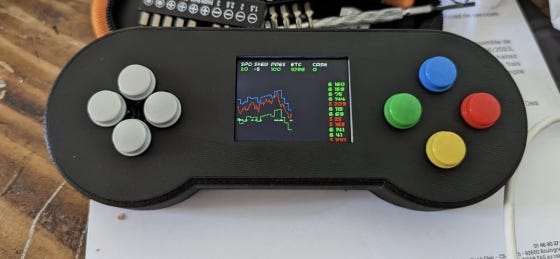This month’s deep dive is into Europe’s patent system and what steps need to be taken for us to optimize intellectual property for innovation. Unsubscribe any time here.
This Edition At A Glance:
7 Things We Like (2 min read).
Portfolio News including a $70m Series-A and launch to space (3 min read).
Deepdive: Fixing Europe's broken patent system (7 min read).
More content from our Frontierspeople.
AndrewJS, AndrewG, Harry, Rebecca; Jeff & Duncan.
7 Things We Like
Chris Pine’s “New Space” Frontier Film premiered on February 1st, showcasing the 21st century’s alignment of government funding with private ambition to produce the dawn of the New Space era.
The launch of ‘Unruly Futures’ by our friends over at Unruly Capital, providing a collection of readings and commentary across the deeptech and investment landscape.
The launch of Mountside Ventures’ ‘YC for VC,’ which will support a new generation of emerging managers across Europe - including several from within our own DragonChasers community.
A fascinating read on the “Short case for Nvidia stock” by Jeffrey Emanuel, detailing the reasons why Nvidia will have a very hard time living up to the currently lofty expectations of the market.
A detailed breakdown on DeepSeek-V3 and DeepSeek-R1, discussing how DeepSeek’s efficiency breakthroughs came because of U.S. sanctions, not despite them; and how Western AI labs must focus on innovation over regulation to stay competitive.
Palle Broe “Pulling back the curtain on the magic of Y Combinator” - breaking down the numbers on YC’s 4,939 portfolio companies, and how where the magic lies.
A breakdown here of round sizes and valuations in startup funding rounds - from Pre-Seed to Series-C in Q4 2024.
Portfolio News
Speak Softly And Carry A Big Stick
Castellion secured $70 million in Series-A funding plus $30 million in venture debt with investors including Lightspeed Venture Partners, a16z, Lavrock Ventures, and Cantos, to accelerate development of lower-cost hypersonic missiles. Watch more here.
Getting More, For Less
Vaire Computing featured on the acclaimed Anastasi In Tech youtube channel showcasing how its “New computer chip is defying the laws of physics.” it provides one of the most detailed peaks so far at what Vaire is working on.
Pale Black Dot
SpaceDOTs hit a huge milestone on January 14 2025, with the successful launch of the DATA DOT platform aboard SpaceX’s Transporter-12 from Vandenberg Space Force Base. The DOT is operating flawlessly, orbiting earth on a LEO sun-synchronous orbit.
You Had Me At “Hello, World!”
With Valentines Day just gone, Paired - the #1 app for couples was once again recognised as app of the day in Apple’s App Store. With poor communication being one of the key reasons for the breakdown in romantic relationships, 10 minutes per day on the Paired app can increase the quality of a relationship by 36%!
Silver Bullets For The Silver Economy
SafelyYou who improve patient care of senior citizens completed its $43 million Series C round. The SafelyYou Respond platform is proven to reduce falls by 40% and fall-related ER visits by 80% using ambient detection and AI. Foundation Capital, Omega Healthcare Investors, Founders Fund, Cross Creek, Samsung Next and Qualcomm Ventures also contributed to the funding round, bringing the total raised by the company to over $100 million.
It’s Not Google’s Fault (Tolerance)
Universal Quantum Co-Founder & CEO, Sebastian Weidt provided his insight on Google’s announcement of the Willow Chip explaining that while there was initially hope that intermediate-scale computers could offer some value to a general consumer, the science shows that qubits need to be scaled by hundreds of thousands (eventually millions) to unlock real-world applications.
Mario Super Smash (Finance) Bros.
QuestDB developer Tancredo Collard has developed a game console called 'Trading Gameboy’ that can simulate stock trading. It uses a Raspberry Pi Pico for computing, leverages QuestDB’s open-source time-series database for access to market data, with both the program and the board being custom designed.
Deepdive: Fixing Europe's Broken Patent System
A Guest Post By 7percent Portfolio Founder Josef Chen of Kaikaku.
(7 min read) As a hardware founder, I’ve personally felt the sheer pain of navigating the patent system. But this isn’t just a startup problem—it’s a crisis for all innovators, including researchers, academics, and small inventors.
Here’s the reality:
In the US, an innovator can file a cheap $75 provisional patent to secure a priority date instantly. This means they can test, refine, fundraise, and collaborate openly for 12 months without jeopardising their intellectual property.
In China, the government subsidises and offers fast-track utility model patents that can be granted in under a year, giving quick, enforceable protection for technical innovations.
In Europe? If an innovator even talks about their invention publicly before filing, they risk losing all patent rights forever. And if they want to file a patent? It’s €2,000–€6,000 upfront, no flexibility, no grace period, no second chances.
Part of why China is dominating drones and robotics - think DJI and Unitree Robotics - is its fast, flexible patent system.
What Does This Mean In Practice?
Academics & Researchers: European universities are world leaders in cutting-edge research, but their scientists often have to choose between publishing their work and patenting it. If their research is public before filing, it’s unpatentable. This creates a perverse incentive to delay sharing knowledge, slowing scientific progress.
Small Inventors: Independent inventors often lack funding to immediately file robust patents. The US system allows them to file a low-cost provisional patent to secure their rights while they seek investment. In Europe, they have to go all-in on expensive filings or risk losing their innovation to larger players with deeper pockets.
Startups & Industry Innovators: Many emerging technologies require rapid iteration and testing. The lack of a grace period means that simply demonstrating an innovation to investors, customers, or partners can render it unpatentable.
The single most important factor is where the invention is physically created. There are no workarounds besides physically moving to a different jurisdiction to innovate. This hard geographic rule forces innovators to make difficult choices, often leading them to leave Europe.
Comparing Patent Systems
A Founder’s Experience: The Cost of a Demo Day
We had to rush out a £6,000 patent filing just to legally present at a demo day. If we didn’t file, we risked destroying our own ability to patent—just by pitching to investors.
A few months later? The product evolved—as most innovations do. That £6,000 patent was now useless. We needed to file again, for another £6,000.
Total cost? Over £12,000 and dozens of wasted hours in just one year.
Had we been in the US, we could have filed a $75 provisional, iterated freely, and only committed to a full filing after 12 months of refinement.
This isn’t just a cost problem. It’s a fundamental bottleneck on innovation.
How to Fix It: Three Simple Reforms
These are not radical ideas. The US and China already do this. Europe can implement these without subsidies or tax breaks, just by adjusting how the UKIPO and EPO works.
Introduce a Provisional Patent System
Give innovators a simple, low-cost £100 filing option to lock in a priority date.
Allow 12 months of flexibility to refine, prototype, and gather funding before committing to a full patent.
Impact: More innovation, less financial risk—empowering startups, researchers, and independent inventors alike.
Implement a 6-Month Grace Period
Introduce a safety net that lets innovators file a patent within six months of public disclosure.
Covers academic publications, investor pitches, crowdfunding, and early-stage product demos.
Impact: Encourages open collaboration, removes the fear of killing IP by simply talking about an idea.
Fast-Track Patents
Lower initial search and examination fees for startups.
Expedited review for first-time inventors, similar to the UKIPO’s Green Channel.
Impact: Startups get faster, cheaper protection—helping them attract investors and secure commercial deals.
The Time for Change is Now
Europe cannot afford to lag behind while other regions support innovation with flexible, cost-effective patent solutions. A broken patent system discourages risk-taking, slows economic growth, and forces talent to relocate to jurisdictions where the rules enable rather than obstruct progress.
The solutions are clear. No subsidies, no handouts—just a modernised patent system that works for startups, researchers, and inventors alike.
If policymakers don’t act, innovators must make their voices heard. Innovation doesn’t wait, and neither should we.
Read more from Josef’s at josef.cn
At 7percent, over 50% of our investments to date have been into IP-driven, Frontier technologies. This could be in anything from next generation quantum computing to the new space economy. Those in our portfolio include OculusVR, Gensyn, Universal Quantum, Magdrive, Plumerai, Beyond Aero, and Mind Portal.
More Content From Frontierspeople
Latest editions of the Upside Podcast with Andrew J Scott discussing:
Our open letter to the UK government on the proposed carried interest policy changes.
Jeff Crusey’s appearance on the Nothing Ventured podcast discussing when mythology breaks reality in venture.
Onwards and upwards!
You’ve received this email as a known contact of the 7percent team or because you requested them. Click here if you would not like to hear from us in future.








